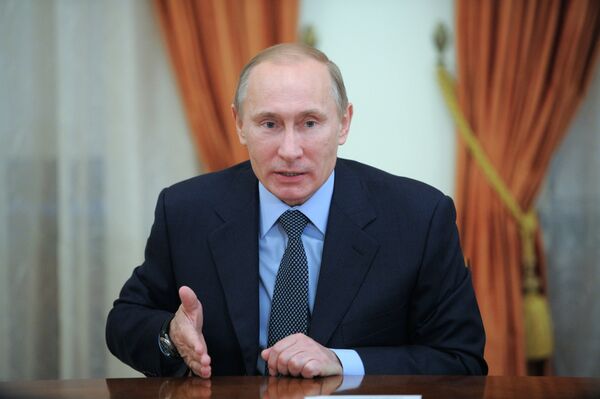Prime Minister Vladimir Putin has two stakes in the legislative elections due next Sunday: his United Russia party needs to retain the majority in the future parliament and, as political analysts agree, the vote should not spoil his own presidential bid with scandals.
“I want to bring your attention the necessity to achieve the maximum result at this vote because if we slacken away the parliament, we, like in some other countries, will not be able to make the necessary decisions in the needed time,” Putin said at a meeting with the party leaders on Thursday.
The premier praised United Russia for its support during the economic crisis of 2008 when the party with its 70 percent of the seats in the State Duma helped his cabinet to implement economic decisions swiftly.
Now, as the party goes to the December 4 vote, its representation in the parliament’s lower chamber might drop from the current 315 seats to just 253 out of 450, according to a poll by the independent Levada Center think tank released Friday.
During the last Duma elections, then-President Putin agreed to head the party’s ticket in what many believed gave a strong boost to the United Russia ahead of the vote. This time, Putin unexpectedly distanced himself from the party’s campaign at its convention in September and effectively appointed President Dmitry Medvedev to lead its ticket.
And although Putin from time to time demonstrates publicly his support of the party, this falls far behind the 2007 campaign when the then-president would gather tens of thousands of supporters on different forums to promote the ruling party.
Putin’s spokesman, Dmitry Peskov, told RIA Novosti that this restrained behavior of the prime minister now does not mean that Putin has turned tepid about the party’s future.
“He is the leader of United Russia that took the responsibility for the developments in Russia, especially during the crisis. The party performed well and, of course, the prime minister would want to see the public appreciations of this effort,” he said in a phone interview.
But political analysts, even within United Russia, concurred that Putin has slashed his bet in the party’s success at the elections and became more focused on having cleaner, more legitimate elections.
Putin has cut his bet in this campaign as he sees that United Russia’s results will not be that complimentary as four year ago, said Pavel Salin, an expert with the Center for Political Assessments, a Moscow think tank.
“Putin’s opponents can do little to influence the final results that United Russia will get, but they will assail the legitimacy of the vote,” he said.
As for United Russia’s future results, losing the constitutional majority by the party but retaining a simple majority will have little effect on the party’s capacity to push the Kremlin’s initiatives through the Duma, the analyst said.
Sergei Markov, a political analyst and United Russia Duma member, agreed, saying that the opposition would seek to attack the legitimacy of the upcoming vote in order to undercut the legitimacy of the presidential elections in March, which Putin is set to win.
“Putin’s critics will challenge this time the legitimacy of exactly those voting mechanisms and procedures that Putin will employ to be elected president in March,” he said.
If it weren’t for Putin’s concern over the legitimacy of the vote, there would have been many more reports about abuse of office by United Russia officials in favor of their party than we have now, the analyst said.
Putin’s decision to drop from United Russia’s ticket in September has come unexpected by most of political observers. In May, Putin set up a United People’s Front, a broad public movement allied with United Russia and designed to attract public interest to the party and bring new faces into it. Until September, Putin was actively promoting the front and the party.
The much-trumpeted front had effectively disappeared from the major national media after September, but Peskov assuredly said that it remained an active project.
Nikolai Petrov, a political scientist with the Moscow Carnegie Center, suggested that Putin changed his mind because he decided, given the global economic turmoil, not to conduct any drastic reforms after becoming president.
“He would have needed a stronger United Russia representation in the Duma to legitimize future reforms, but he might have decided that it is too risky to conduct them now,” he said.
In absence of such a long-term ambition, Putin is disinterested in cheerleading for the party in the ongoing campaign, Petrov said.
“Perhaps he believes that the extra several percent that it would garner to United Russia are not worth his time and energy,” the analyst said.

